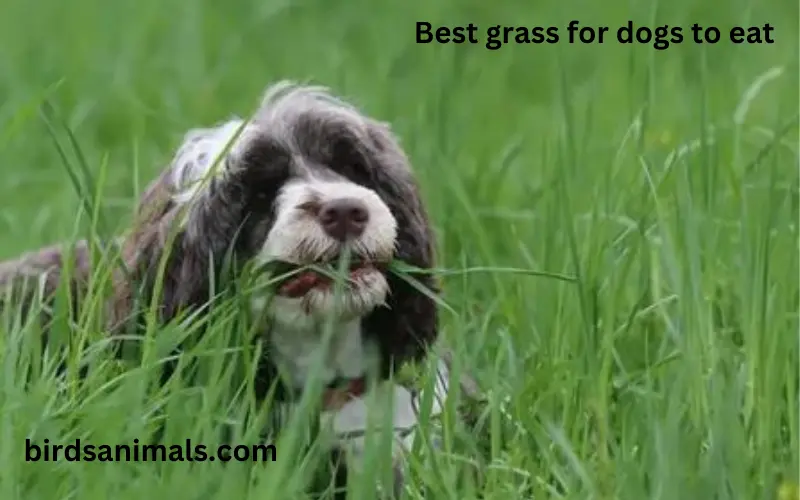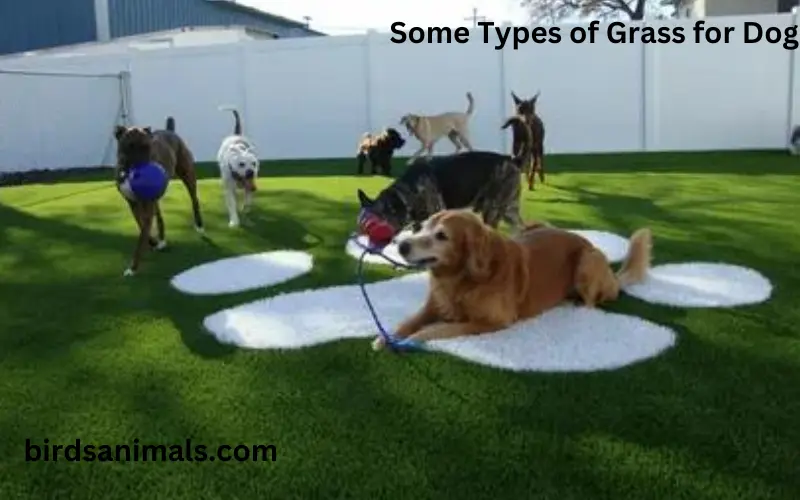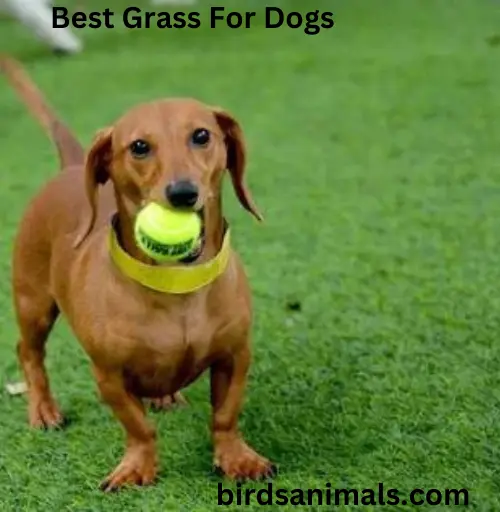Best Grass For Dogs: The fun of playing with your guard dog inside the front plot of your house cannot be found anywhere else. Playing all these games can give you and your dog a mental boost. Eliminates current fatigue. Now, you should know very well how to choose your green plot and its grassy plot. Your grassy plot should be so that nothing can be broken up by the dog playing in it. Today, we will discuss a green grassy plot for some dogs to play. Choose an excellent grassy plot for dogs to play in that suits your yard.
Best grass for dogs in the UK
When choosing grass for areas frequented by dogs in the UK, you’ll want a hardy and resilient grass variety that can withstand the effects of urine. Dog urine can cause yellowing and burning of grass due to its high nitrogen content.
Perennial Ryegrass: This grass type is known for its fine texture and ability to recover quickly from damage. It’s commonly used in mixtures for lawns and sports fields.
Fescue Grass: Fine fescue grass varieties, such as creeping red or chewings fescue, are known for their delicate texture and shade tolerance.
Kentucky Bluegrass: Kentucky Bluegrass is a popular choice for lawns in the UK. While it may not be as resistant to dog urine as other varieties, it can still handle moderate traffic and urine.
Best grass for dogs in Urine
When choosing grass for areas where dogs frequently urinate, you’ll want to consider grass varieties that are hardy and resistant to urine burn. Dog urine contains nitrogen, which can harm some grass types, leading to yellow or brown spots. Here are some grass varieties known for being more resistant to dog urine.
Fescue grasses: Fescue varieties are known for their durability and resistance to stress, including damage from urine.
Perennial Ryegrass: This grass type is hardy and can recover well from stress, including damage caused by dog urine.
Kentucky Bluegrass: While not as resistant as some other types, Kentucky Bluegrass can tolerate moderate dog urine and is known for its lush, green appearance.
Best grass for dogs in Australia
In Australia, similar considerations apply when selecting grass for areas frequented by dogs. The climate in Australia can vary significantly, so it’s essential to choose grass varieties that are well-suited to the specific region and climate in which you live.
Some Grass Varieties
Kikuyu Grass: Kikuyu grass is a warm-season grass well-suited to the Australian climate. It is known for its rapid growth, drought tolerance, and ability to recover from damage.
Buffalo Grass: Buffalo grass varieties like Sir Walter or Palmetto are popular in Australia. They are known for their lush appearance, durability, and ability to recover from wear and tear.
Couch Grass: Couch grass, particularly varieties like Wintergreen or Santa Ana, is another warm-season grass common in Australia.
Best grass for dogs to eat
While it’s generally not recommended for dogs to eat large amounts of grass, as it can sometimes lead to vomiting or other digestive issues, some pet owners find that their dogs do enjoy grazing on grass occasionally.
Wheatgrass: Wheatgrass is a common choice for pet owners who want to provide safe grass for their dogs to eat.
Barley Grass: Barley grass is another option that is safe for dogs. Like wheatgrass, it’s often available in pet stores.
Oat Grass: Oat grass is another variety that is safe for dogs.

Best grass for dogs in Texas
In Texas, the climate can vary across the state, but it is generally characterized by hot summers and mild winters. When choosing grass for areas frequented by dogs in Texas, selecting varieties that can withstand the heat, occasional drought conditions, and the wear and tear associated with pet activity is essential.
Bermuda Grass: Bermuda grass is a warm-season grass that thrives in the heat of Texas. It is known for its durability, drought tolerance, and ability to recover quickly from damage.
St. Augustine Grass (Stenotaphrum secundatum): St. Augustine grass is another warm-season grass popular in Texas. It has a lush appearance, is shade-tolerant, and can handle moderate traffic.
Zoysia Grass: Zoysia grass is a warm-season grass that can tolerate heat and drought. It forms a dense turf and is known for its fine texture.
Best grass for dogs in Southern California
Southern California has a Mediterranean climate with hot, dry summers and mild, wet winters. When choosing grass for areas frequented by dogs in Southern California, selecting varieties that can handle the heat, have good drought tolerance, and are resilient to wear and tear is important.
St: St. Augustine grass is a good option for areas with partial shade. It has a lush appearance, good heat tolerance, and can handle moderate foot traffic.
Best grass for dogs in Florida
Florida’s climate is characterized by high temperatures, high humidity, and frequent rainfall, making it well-suited for warm-season grasses. When choosing grass for areas frequented by dogs in Florida, it’s essential to consider the region’s heat, humidity, and potential for common pests.
When choosing grass for areas with dogs, consider grass blends or mixes labelled as pet-friendly or hardwearing.
Regular lawn care practices such as proper watering, mowing, and fertilizing are crucial for maintaining a healthy lawn in Florida.
Consulting with local nurseries or landscaping professionals in Florida is recommended for personalized advice based on your specific location and lawn conditions.
Best grass for dogs with allergies
If you or your dog have allergies, it’s essential to consider grass varieties less likely to trigger allergic reactions. While individual sensitivities vary, some grasses are generally considered lower in allergenic potential.
Tall Fescue: Tall fescue is a cool-season grass often used in lawns in various climates. It has a coarser texture but is generally less likely to cause allergies than other grass types.
When dealing with allergies, it’s not only the type of grass that matters but also how well you maintain your lawn.
Some Types of Grass for Dog

1. Kentucky’s bluest grass for dog
Kentucky bluegrass is a beautiful Best grass for dog
Does your pup run circles around you constantly with seemingly never-ending energy? This type of event drains your energy and can also threaten your life. It will also reduce your grass to ashes. But you can avoid this problem by using Kentucky Bluegrass. It thrives in cool weather.
After it became popular among the people, it started to spread more and more. Quick-healing, thick grass is up to the challenge of your dog’s racing paws. It grows abundantly in winter.
2. Perennial ryegrass is an excellent grass for dogs
Perennial Ryegrass This is a very hardy type of grass. One of its many qualities is that it can withstand dog urine. If you are the owner of a vast dog or you have many dogs, choose this grass. It is not too hardy and performs well in cold weather. And in mild winters, it gives a lovely green colour. This grass requires more water and fertilizer than other grasses. Beautiful green colour. This grass requires more water and fertilizer than other grasses.
3. Zoysia grass: A great type of grass for dogs
It is an excellent type of grass, which is very dense and slightly grainy, which makes it more attractive for high foot traffic. It also performs well in hot summers. Due to this and drought resistance, this grass does not need to be watered frequently.
4. Bermuda’s best grass for dog
Bermuda Best grass for dogs, is a warm-season grass that thrives in hot climates. It’s known for its resilience and ability to recover from damage, making it suitable for dogs that love to dig or play rough. Bermuda Grass forms a dense turf that can handle high foot traffic and resist dog-induced damage. However, it’s worth noting that this grass type goes dormant in the winter, so it may not be the best choice for regions with cold winters.
5. Zoysia best grass for dog
Zoysia Best Grass for Dogs is an excellent option for dog owners looking for a hardy grass type that can handle sun and shade. It has a thick, dense growth pattern, which can withstand heavy paw traffic. Zoysia Grass is known for recovering quickly from damage, making it ideal for yards with active dogs. Remember that it’s a warm-season grass, so it may not be suitable for colder climates.
About the best grass for dog
A lush green lawn is a source of pride for many homeowners, but maintaining a healthy and dog-friendly lawn for those with furry friends can be challenging. Dogs love to run, play, and explore outdoors; in the process, they can put your grass through its paces. If you’re a dog owner looking to strike a balance between a beautiful lawn and a happy pup, choosing the right type of grass for your yard is essential. This article will explore the best dog grasses, helping you create a pet-friendly haven in your backyard.
Tips for Maintaining a Dog-Friendly Lawn
Once you’ve chosen the suitable grass for a dog for your yard, here are some tips to help maintain a healthy and dog-friendly lawn.
Regularly water your lawn to keep the grass healthy and prevent urine spots. Diluting your dog’s urine with water immediately after they urinate can also help minimize damage.
Train your dog to use a specific yard area for bathroom breaks to minimize concentrated urine damage to the grass.
Please trim your dog’s nails to reduce the risk of them tearing up the grass when they play or dig.
Use designated paths or play areas for your dog’s activities to concentrate wear and tear on specific lawn areas.
Consider incorporating hardscaping features like pathways, pavers, or mulched play areas to reduce the impact of dog traffic on your grass.
Some FAQS About the best grass for dog
Q 1: What is the best type of grass for a dog in a yard with dogs?
Ans: The best type of grass for a yard with dogs depends on various factors, including your location, climate, and your dog’s behavior. Kentucky Bluegrass, Perennial Ryegrass, Bermuda Grass, Zoysia Grass, and Fescue Grass are popular choices for dog-friendly lawns, each with advantages.
Q 2. Are there any grass types that are resistant to dog urine?
Ans: While no grass is entirely immune to dog urine, some grasses are more resistant than others. For example, Kentucky Bluegrass and Perennial Ryegrass tend to handle urine better due to their dense growth patterns and ability to recover from damage.
Q 3. How can I prevent my dog from damaging the lawn?
Ans: To prevent your Best grass for dogs from damaging the lawn, consider training them to use a designated area for bathroom breaks, keeping their nails trimmed, and providing them with alternative play areas like mulched sections or paths. Regularly watering the lawn can also help dilute urine and minimize damage.
Q 4. Can I plant a mix of the Best grass for dog types for a dog-friendly lawn?
Ans: Yes, planting a mix of Best grass for dog types can be a good strategy for a dog-friendly lawn. Blending grass varieties with different characteristics, such as a combination of Kentucky Bluegrass and Perennial grass, can help improve resilience and adaptability.
Q 5. Is there a grass type suitable for my yard’s sunny and shaded areas?
Ans: Yes, Fescue Grass is a good choice for yards with both sunny and shaded areas. Some Fescue varieties are shade-tolerant and can provide a lush lawn in various lighting conditions.
Q 6. Should I consider artificial turf as an option for a dog-friendly lawn?
Ans: Artificial turf can be an option for dog owners seeking a low-maintenance and durable lawn. However, it doesn’t offer the same natural feel as real grass and can get hot in direct sunlight. It’s essential to weigh the pros and cons before choosing artificial turf.
Q 7. What maintenance practices can help keep my dog-friendly lawn in good condition?
Ans: Maintaining a dog-friendly lawn includes regular watering, mowing, and fertilizing as needed. It’s also essential to promptly clean up after your dog to prevent waste from damaging the grass. Trimming your dog’s nails can help minimize damage from scratching and digging.
Q 8. Can I oversee my lawn with dog-friendly grass types to improve its resilience?
Ans: Yes, overseeding with dog-friendly Best grass for dog types can help improve your lawn’s resilience. Consult with a lawn care professional to determine the best time and method for overseeding in your region and climate.
Q 9. Are there any Best grass for dog types that are particularly resistant to digging by dogs?
Ans: While no Best grass for dog type is entirely immune to digging by dogs, Bermuda Grass is known for its ability to recover quickly from digging and other damage. Proper training and supervision of your dog can also help prevent excessive digging.
